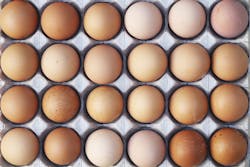Eggshell nanoparticles increase strength of bioplastic
Tiny pieces of of eggshell can help create a new biodegradable material that bends but does not easily break, according to a recent study.
Researchers at Tuskegee University in Alabama found that adding nanoparticles made of eggshells to bioplastic increases the strength and flexibility of the material, potentially making it more attractive for use in the packaging industry.
Their findings were presented at the 251st National Meeting & Exposition of the American Chemical Society (ACS).
“We’re breaking eggshells down into their most minute components and then infusing them into a special blend of bioplastics that we have developed,” said Vijaya K. Rangari, Ph.D. “These nano-sized eggshell particles add strength to the material and make them far more flexible than other bioplastics on the market. We believe that these traits, along with its biodegradability in the soil, could make this eggshell bioplastic a very attractive alternative packaging material.”
Rangari, graduate student Boniface Tiimob and colleagues at Tuskegee University experimented with various plastic polymers before ending up with a mixture of 70 percent polybutyrate adipate terephthalate (PBAT), a petroleum polymer, and 30 percent polylactic acid (PLA), a polymer derived from cornstarch. PBAT, unlike other oil-based plastic polymers, starts degrading as soon as three months after it is put into the soil.
This mixture had characteristics that satisfied the researchers, but in order to increase the flexibility of the material they created nanoparticles made of eggshells, which are absorbent, lightweight and mainly composed of calcium carbonate, a natural compound that easily decays.
Adding these nanoparticles to the 70/30 mixture of PBAT and PLA made the mixture 700 percent more flexible than other bioplastic blends. This flexibility could make it ideal for use in retail packaging, grocery bags and food containers.
The researchers are also investigating using eggshell nanoparticles to enhance wound healing, bone regeneration and drug delivery.
